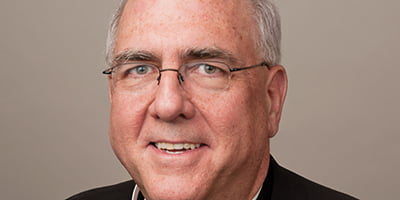
by Archbishop Joseph F. Naumann
Tucked in the octave celebration of the great solemnity of Christmas is the feast of the Holy Family. Each year, on the Sunday between Christmas and New Year’s, we commemorate the silent, hidden years that Jesus spent in Nazareth.
While we know nothing of the details of these years, it was in Nazareth where Jesus spent the vast majority of his time on earth. It was the life of the Holy Family that provided the school of human formation for Jesus.
The family was then, and remains, the most important of human institutions. The foundation of family life is marriage.
Healthy and vibrant marriages create the ideal setting for the rearing of children. There are mounds of social science data that reinforce what we know intuitively — that children have the best chance for healthy development when they receive the love of a father and a mother and they grow up witnessing the faithful love of their father for their mother and their mother for their father.
Recently, I was attending the funeral Mass for a mother of one of our priests. In the homily, the priest-son said that he and his siblings had grown up in a “Leave It to Beaver” home, referencing the sitcom that was popular in the early 1960s that presented a somewhat idyllic picture of family life. He asked his brother and sisters the rhetorical question: “Was there ever a time when we doubted the love of our Mother and Father for us?”
While the depiction of Ward and June Cleaver in “Leave It to Beaver” perhaps failed to depict all of the struggles that many married couples experience, it is almost impossible today to find a positive depiction of marriage on television or in movies. As much as our media represents our culture and influences our culture, this is not a healthy indicator.
The love that Jesus asks of married couples is very different from the popular notion of love in our culture. Our music, literature and films depict love as an emotion in which one “falls into” and “falls out of,” as if it was the result of some magical chemistry between two people over which they have absolutely no control.
What our society mistakes for love is really not love at all. In many ways, the “love” portrayed in the popular culture is not about giving, but all about getting. If you rewrote the marriage vows to articulate what our culture believes about love, they would sound something like this: “I will love you in the good times, but when it gets hard, I am out of here. I will love you as long as you stay healthy and can fit into your wedding dress or tuxedo. I will love you for two years or five years and then we will renegotiate our contract.”
There is no beauty in such vows. Loving someone as long as it is easy, as long as it feels good, is not about love at all. This is merely selfishness masquerading as love.
What is so breathtaking about the vows that a couple makes on their wedding day is their boldness. In effect, a couple pledges to each other no matter what changes, challenges, or adversities the future holds, their love will remain constant.
Our emotions and feelings are good. God gives us the emotions that we associate with love to inspire a couple to make the unconditional commitment that is the bedrock of marriage. More than an emotion, love is an act of the will. It is a decision that must be renewed every day to place the good of one’s spouse before one’s own desires. It is a commitment to make any sacrifice for the happiness and well-being of one’s wife or husband.
The U. S. Conference of Catholic Bishops has launched a pastoral initia- tive to strengthen and support marriages within the church and society. The church has produced some public service announcements (PSAs) that have aired on some of our local radio and television stations. These PSAs consist of the responses made by people on the street when they were asked the question:
“What have you done for your marriage today?”
These PSAs are an interesting and entertaining way to encourage married couples to think about how they need to invest in their marriage every day — to consider what they can do to strengthen their marriage. If you would like to see these PSAs and receive other helpful information on ways to strengthen your marriage, your can go to the Web site: www.foryourmarriage.org.
Christian married love is not about mediocrity. It is a call to heroic love that recognizes in the ordinary events of everyday family life the opportunity to love in a remarkable way.
I am impressed as I visit the parishes by the beauty and the goodness of the families in our Archdiocese. These wonderful families are the fruit of the faithful, sacrificial and joyful love of married couples.
As we commemorate the feast of the Holy Family, I pray that every married couple in the Archdiocese appreciates the importance of the vocation to which you have devoted your life. Thank you for the countless hidden sacrifices you make every day for your marriage and your family! May you taste the joy of giving your life for something as beautiful, noble and important as creating for your spouse and children a community of love and faith where virtue is nurtured and fostered in the ordinary events of family life!

